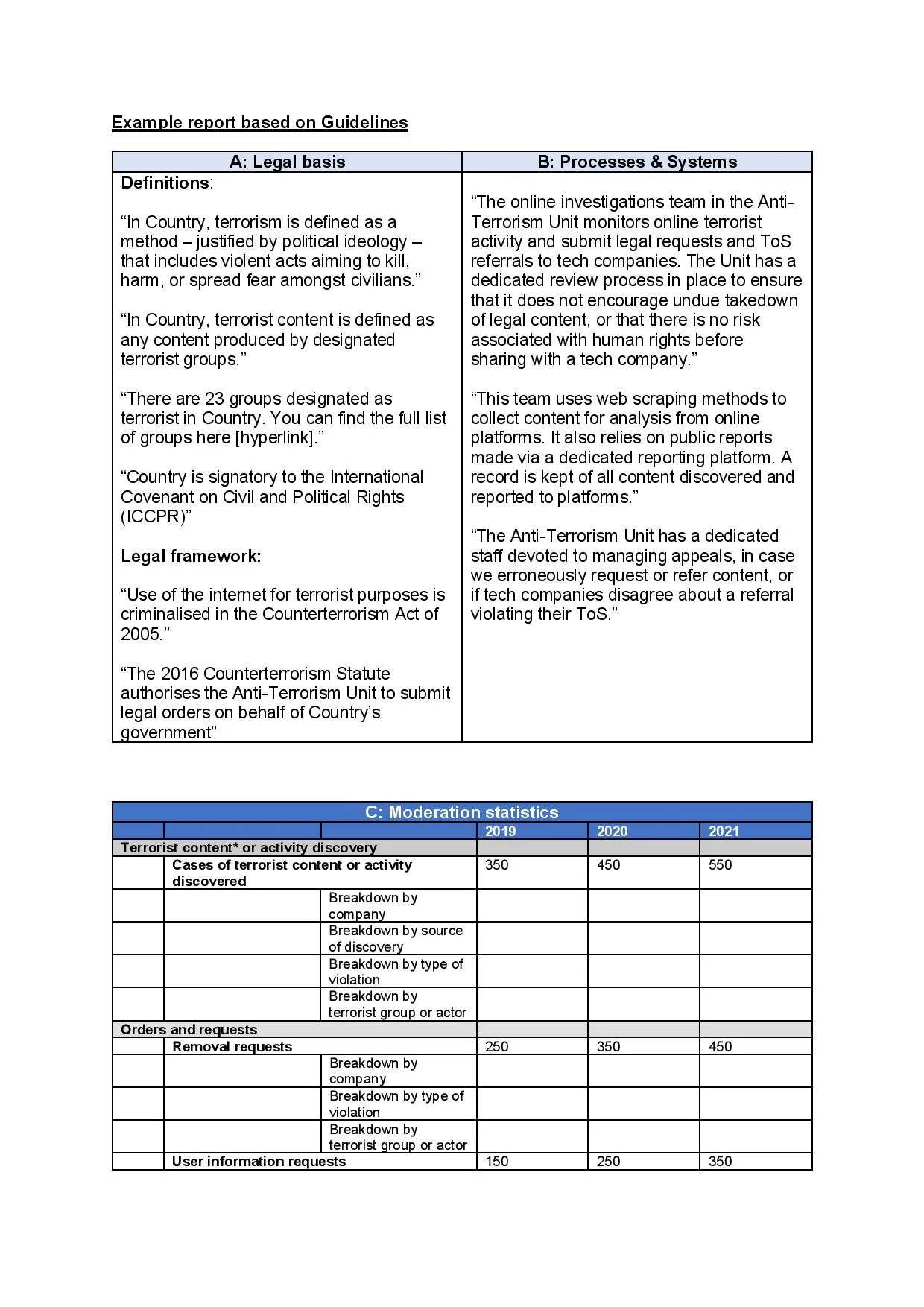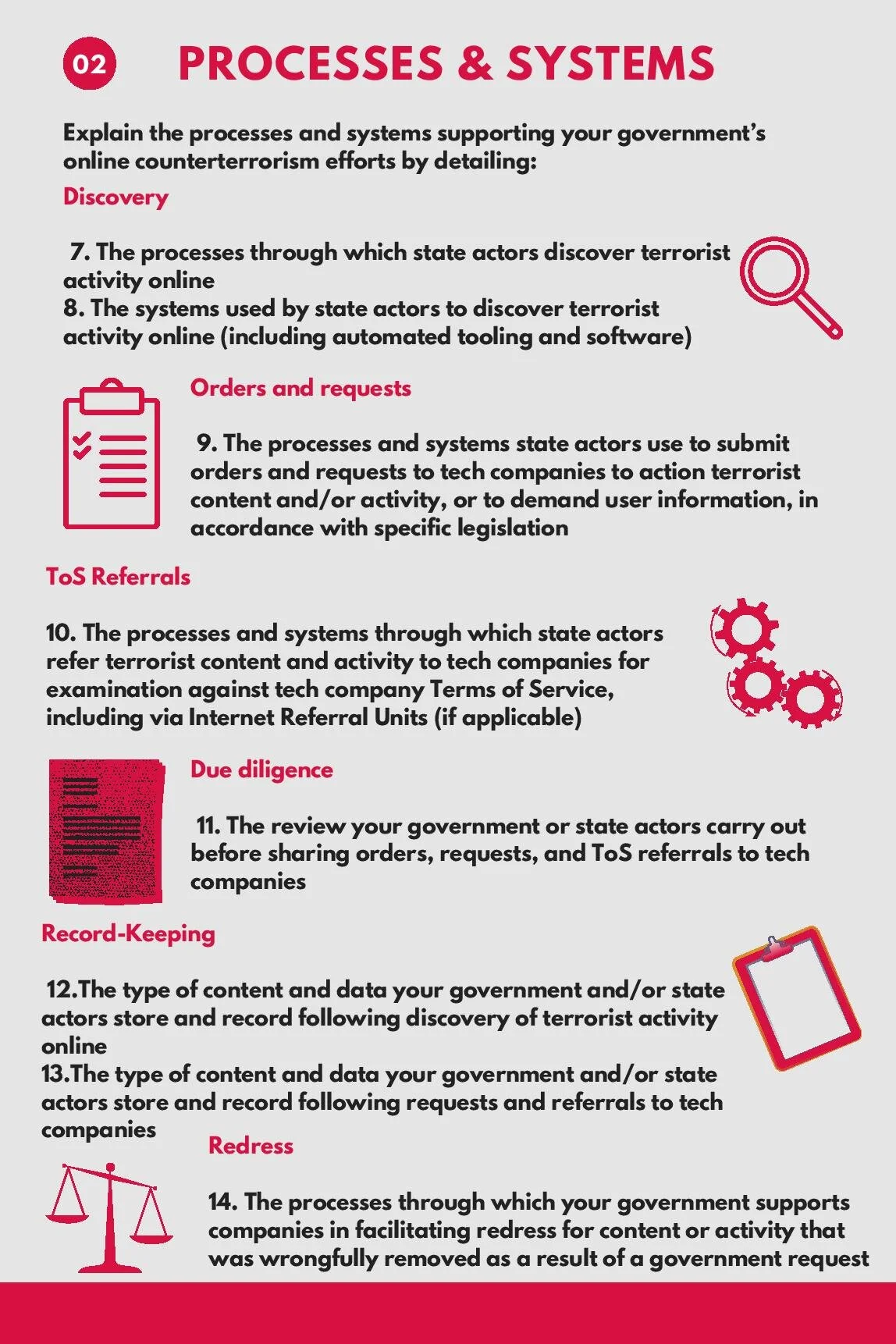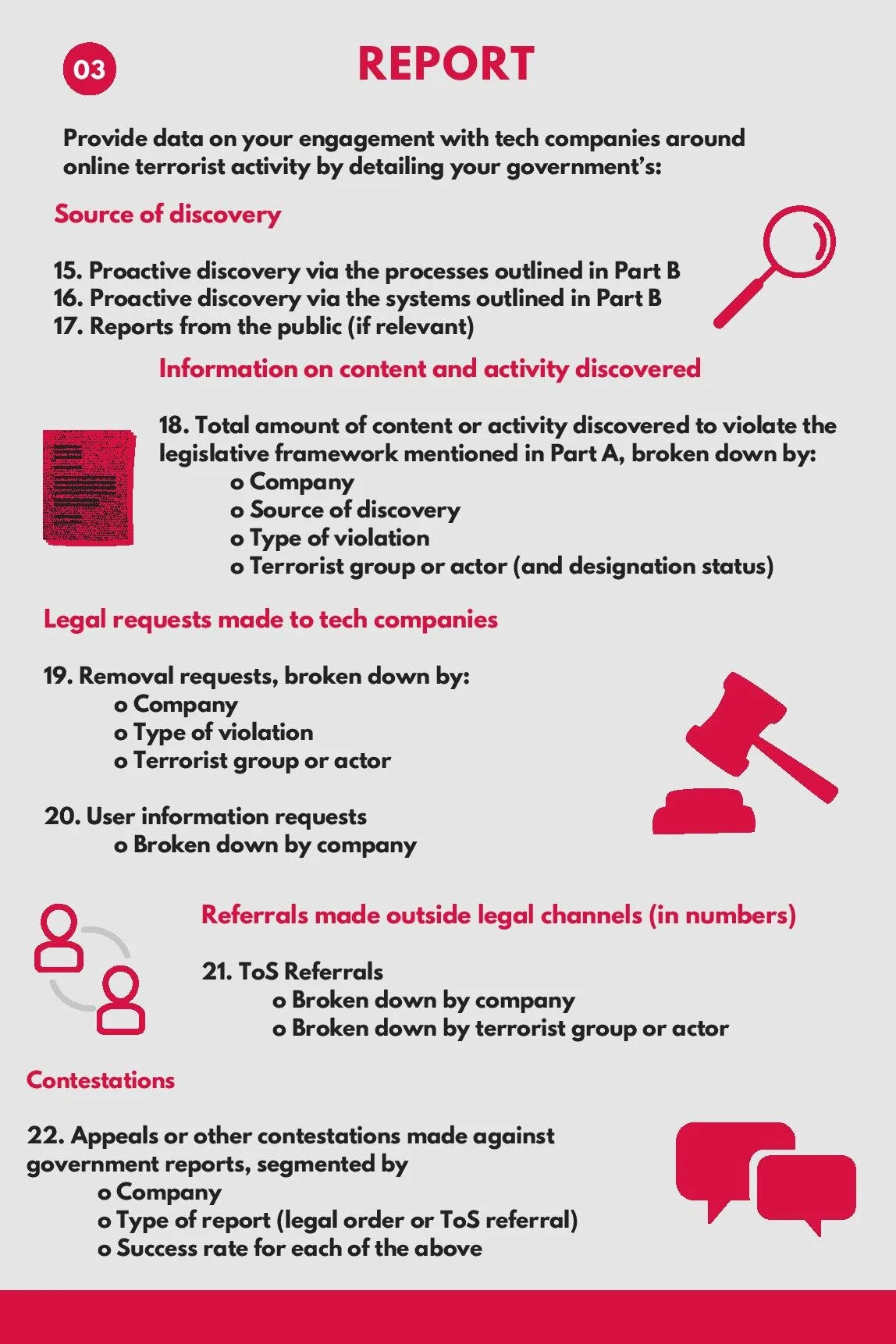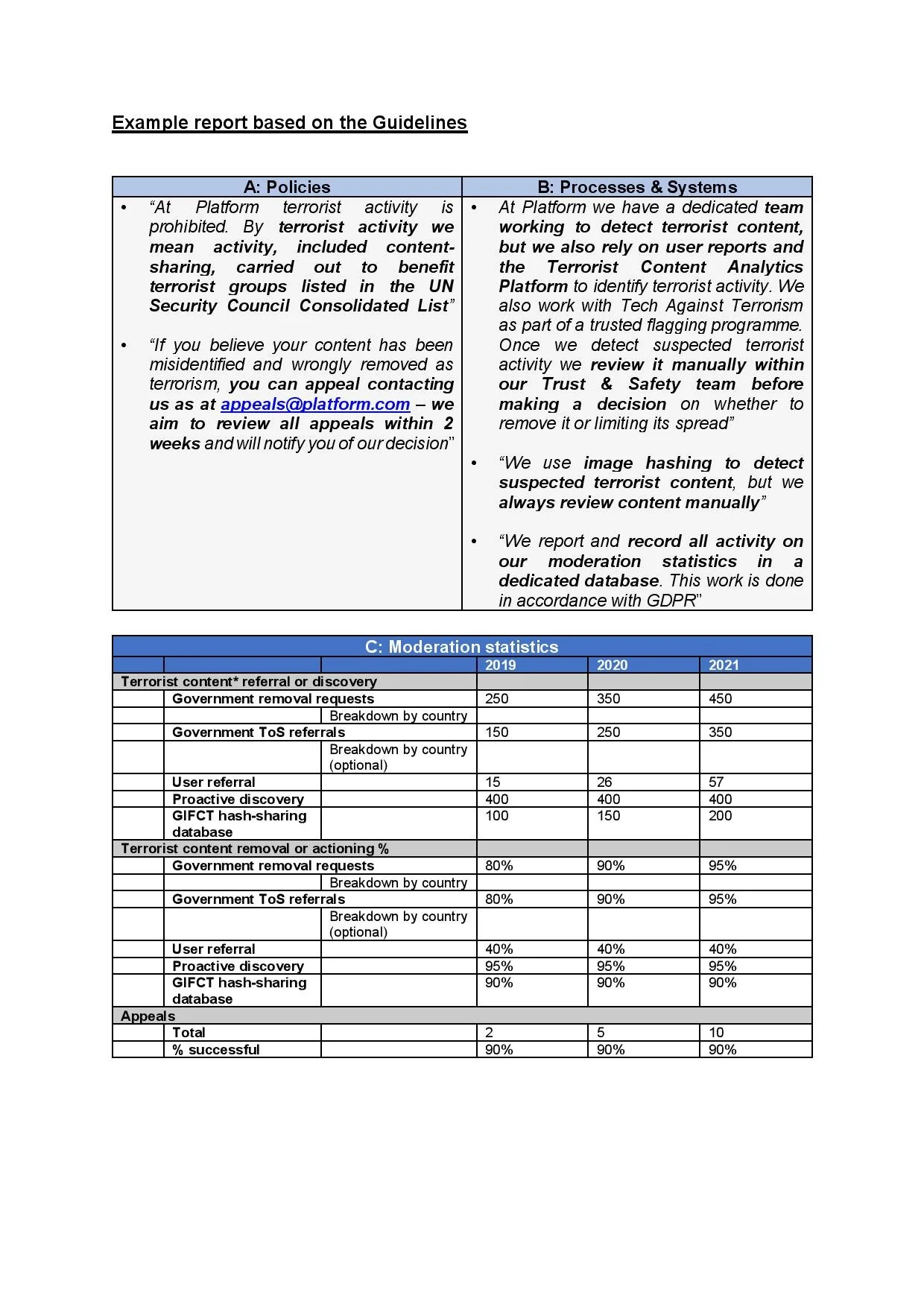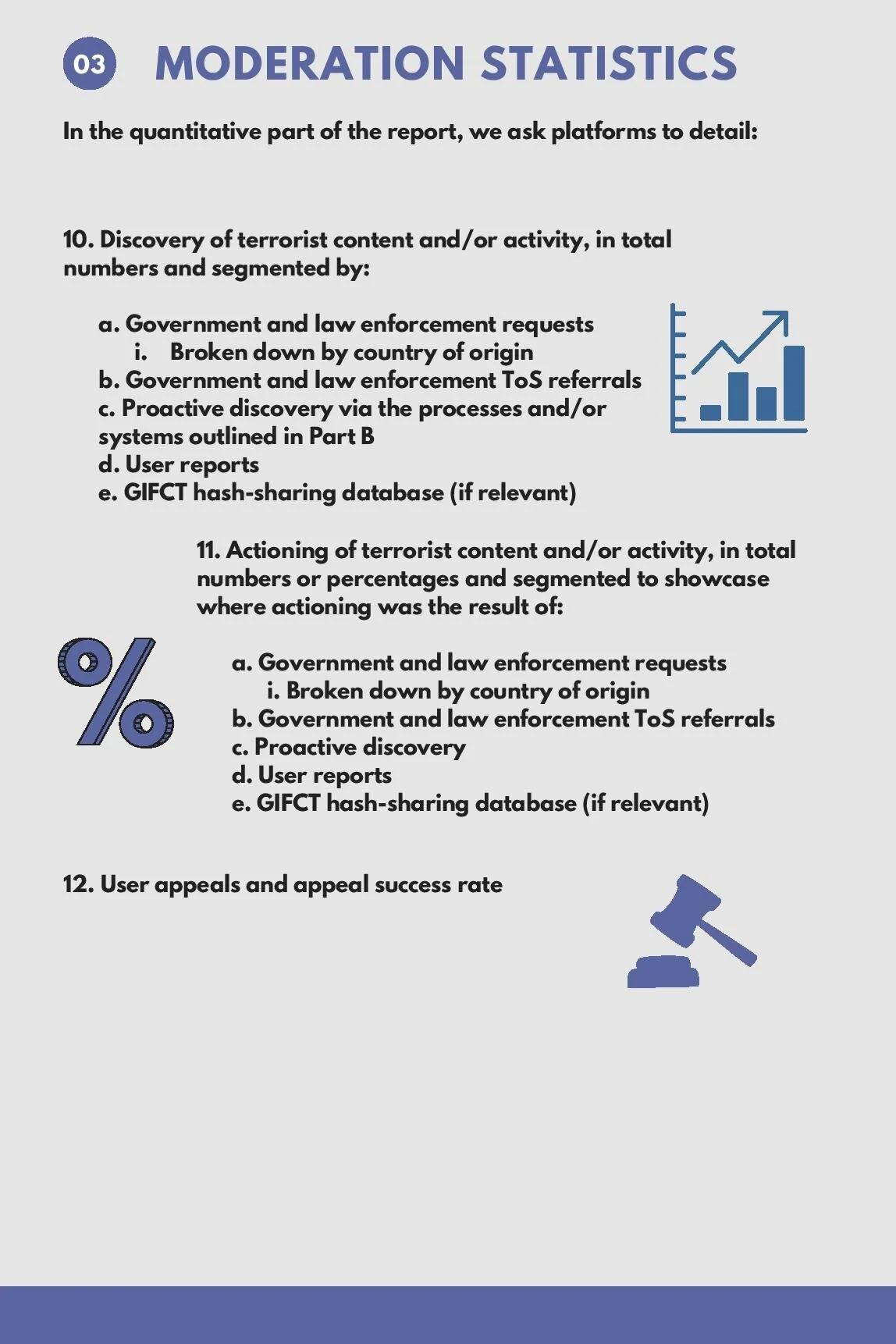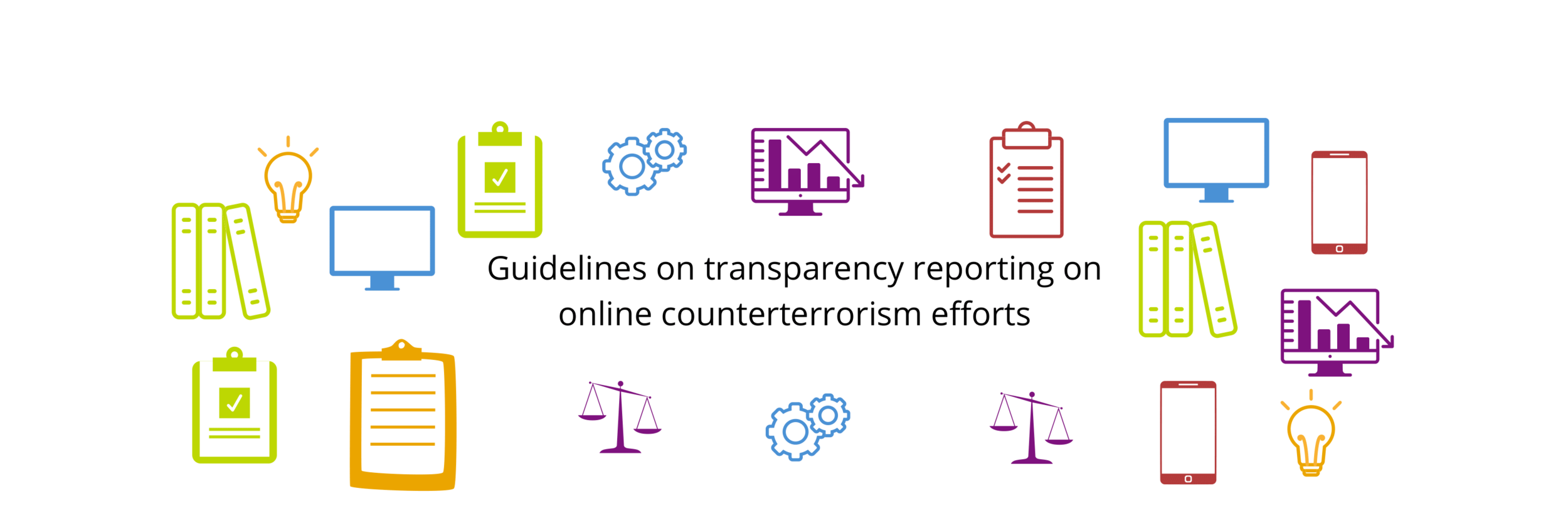
Transparency is vital to ensure accountability towards the public and internet users, and transparency reporting on counterterrorism efforts provide insight on to what extent human rights and fundamental freedoms are respected across the internet as part of the campaign to tackle terrorist use of the internet.
These Guidelines seek to improve transparency and accountability from governments and tech companies around online counterterrorism activities. The Guidelines serve as a starting point for increased transparency, and it is our aim that all governments and companies will report on the baseline set out in the Guidelines.
Transparency reporting guidelines for governments
Government transparency is vital to ensure that governments are accountable to their citizens and to internet users. We ask governments to report on the legal basis that underpins their online counterterrorism activities and on their commitment to international law.
We also ask governments to detail the processes and systems they use to discover, report, and store terrorist content and activity, and what redress mechanisms they provide. Lastly, we ask governments to quantitatively report on their counterterrorism activities.
Transparency reporting guidelines for tech companies
For tech companies, transparency is a process in which transparency reporting is an outcome. To ensure meaningful transparency across the tech industry, we ask companies to report on a small number of core metrics that covers policies, processes, systems, and outcomes.
The Guidelines complement the practical work Tech Against Terrorism carries out in support of the tech industry, particularly through the Mentorship Programme.
About
These Guidelines are created by Tech Against Terrorism, an initiative supported by the United Nations Counter-Terrorism Executive Directorate (UN CTED) that helps tech companies in tackling terrorist use of the internet whilst respecting human rights.
Tech Against Terrorism’s practical support to increase tech sector transparency and accountability
Through its Mentorship Programme, Tech Against Terrorism has since 2018 mentored 25 tech platforms to help them tackle terrorist use of their platforms whilst respecting human rights and freedom of speech. The Mentorship Programme is underpinned by Tech Against Terrorism’s commitment to meaningful transparency and accountability from the tech sector. Practically, Tech Against Terrorism supports tech companies in the production of transparency reports and has supported a wide array of platforms by providing bespoke transparency recommendations. The programme also supports tech platforms in strengthening transparency and accountability mechanisms around their content moderation, and facilitates developing best practices around transparency in a way that works for the specific platform.
Tech Against Terrorism’s support model is based on a holistic approach to transparency reporting that recognises that transparency is a process, in which transparency reporting is an outcome. To that effect, platforms need – and receive as part of the Mentorship Programme – support in introducing and improving the policies and processes required to produce a transparency report.
As of July 2021, four of Tech Against Terrorism’s mentees have published their first transparency report as a result of Tech Against Terrorism’s support in the Mentorship Programme, including ASKfm and JustPaste.it. One other mentee has expanded their existing efforts and included additional metrics on violent extremist content following Tech Against Terrorism’s review of its existing reports.”
Tech Against Terrorism has notably supported JustPaste.it and Ask.fm in publishing their first transparency reports.
“For the smallest platforms with limited resources it is crucial to be time-efficient in all of their actions. Creating a first transparency report may be much easier when done with help from experienced specialists. TaT was able to provide answers to all questions regarding what should be included in such a report having in mind platform-specific requirements and how to present them to the users in a clear way. Platform can then focus on actual numbers extraction and content of the transparency report, without doing extensive research first.”
– Mariusz Żurawek, Founder & Owner, JustPaste.it
“Tech Against Terrorism has mentored ASKfm in our research every step of the way, providing invaluable collaboration in creating our first Transparency report. We believe in the importance of reporting to our users’ confidence in the security of our platform.”
– Viktoria Moroz, Head of Moderation, ASKfm
For companies that have completed the mentorship programme and became Tech Against Terrorism Members, TAT continues to provide support with transparency reports. TAT Regularly reviews and provides recommendations when members publish their transparency reports. TAT extends this support to GIFCT members.
To learn more about Tech Against Terrorism’s support for transparency reporting as part of the mentorship programme, please see The Tech Against Terrorism Mentorship | 2018 – 2021 Overview.
Tech Against Terrorism’s resources for transparency reporting
For further Tech Against Terrorism transparency reporting resources, please see below for our related blogpost, webinars, as well as resources within the Knowledge Sharing Platform.
The Knowledge-Sharing Platform: The Knowledge Sharing Platform (KSP) is a platform developed by Tech Against Terrorism to provide smaller tech companies with a collection of interactive tools and resources designed to support their operational and policy-oriented requirements with regard to developing and implementing an effective and human rights compliant counterterrorism response. The KSP includes a section dedicated to Transparency Reporting, which hosts all of TAT’s resources on transparency reporting. This includes TAT’s key recommendations and a transparency report “menu” for platforms to have an overview of possible metrics of inclusion.
o Transparency reporting for smaller tech platforms
o Accountability mechanisms for tech platforms
(Please note these webinar recordings are password protected. Should you wish to view these recordings please contact us at contact@techagainstterrorism.org)
Background
Transparency is vital to ensure that governments and the tech industry are accountable to the public and internet users. Transparency reporting provides insight on to what extent fundamental freedoms such as freedom of expression and the right to privacy are respected across the internet. It can also encourage and recognise meaningful action from tech companies in tackling terrorist use of the internet and provide crucial insight on this threat. Transparency should therefore be considered as a key component of counterterrorism online, and transparency reporting has been a core part of Tech Against Terrorism’s support for the tech sector since 2017, including in the Mentorship Programme.
Tech companies and governments both drive and participate in efforts to counter terrorism online. Larger tech companies have invested significant resources in staff and tools to identity and remove terrorist content and disrupt activity. Smaller tech companies, where a majority of terrorist exploitation currently occurs, are to the best of their abilities also taking action against this threat. On the government side, some governments submit legal orders compelling companies to remove material based on local laws. Other governments have established law enforcement teams that monitor the web for terrorist content and report it to platforms. Several governments and intergovernmental organisations have also set up voluntary collaboration frameworks aimed at tackling terrorist activity online.
Larger tech platforms have made significant strides and now produce detailed transparency reports on their activities to tackle terrorist exploitation of their services. Smaller tech platforms often want to be transparent but are in need of support to produce reports. We regret that no government, to our knowledge, seems to have published meaningful transparency reports on their actioning requests and referrals to tech companies.
To drive increased transparency across both the tech and government sectors, we are launching the Tech Against Terrorism Guidelines for transparency reporting on online counterterrorism efforts.
Key Considerations
1. Smaller platforms should be prioritised
The majority of terrorist and violent extremist activity occurs on smaller platforms. Terrorists exploit such platforms due to their lack of capacity to respond to the threat, which is why support mechanisms for smaller companies are needed. If the aim is to increase tech sector transparency on terrorist use of the internet and how the tech sector responds, we need to ensure that the platforms most used by terrorists are able to produce reports.
2. Smaller platforms may lack capacity
Smaller platforms often do not have resources to implement or maintain processes that support transparency reporting across a multitude of metrics. Given that a majority of terrorist activity online takes place on smaller platforms, it is important to encourage improvement by setting realistic targets for smaller companies.
3. Pay attention to process
Transparency reporting is an outcome that starts with introducing policies and moderation processes. Many smaller companies might not have these in place. It is important to not compel the smallest platforms to produce reports with a large amount of detailed metrics for which they do not have the policies, processes, or tools to develop. Instead, focus should be on supporting platforms implement such processes.
4. Diversity
Different platforms will have different purposes, policies, and processes in place. This should be encouraged as part of a diverse and vibrant internet. In the absence of international consensus around key definitions of terrorism and/or violent extremism, companies use varying working definitions of these terms and will therefore remove different types of content under such policies. A platform aimed at children might not have a specific policy on terrorism, but instead include it as part of a wider “abusive / violent content” category. Even platforms that do explicitly prohibit terrorism might differ in what content or activity they prohibit, as some platforms might allow terrorist content if shared for educational or journalistic purposes, whereas others will not. Such diversity means that mandating standardised reporting will make companies squeeze data points into pre-made categories which will not render transparency reporting meaningful.
5. Rule of law and incentives
Transparency reporting should not be used as a tool by which to introduce new content moderation demands for tech platforms in an extra-legal fashion. The risk with compelling companies to report on a pre-determined number of metrics without consideration to platform capacity, policy, or process is that we create incentives for companies to remove content for which there is no legal basis, or that platforms will over-zealously remove content to placate policy-makers. Such risks are likely exacerbated by the fact that there is little consensus around key terms like terrorism and/or terrorist content. Any transparency reporting demands therefore need to be underpinned by a clear legal basis, for example via designation of terrorist groups.
6. Meaningfulness
Whilst transparency is a goal in itself, we should strive towards encouraging transparency that leads to meaningful insight. To ensure that such meaningful transparency is practical for smaller companies, we suggest focussing on a smaller number of transparency metrics to facilitate evaluation of platforms’ records over time.
7. Reciprocity
We also see transparency reporting as an important way to encourage governments to uphold human rights. We encourage governments to publish transparency reports regarding their content referrals and removal requests.


